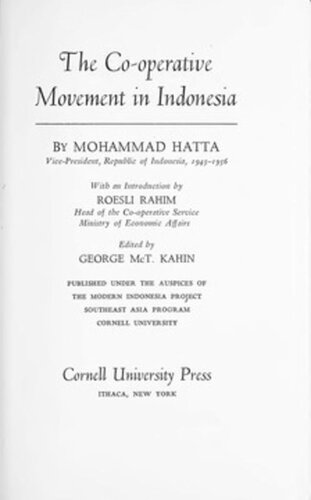

Most ebook files are in PDF format, so you can easily read them using various software such as Foxit Reader or directly on the Google Chrome browser.
Some ebook files are released by publishers in other formats such as .awz, .mobi, .epub, .fb2, etc. You may need to install specific software to read these formats on mobile/PC, such as Calibre.
Please read the tutorial at this link: https://ebookbell.com/faq
We offer FREE conversion to the popular formats you request; however, this may take some time. Therefore, right after payment, please email us, and we will try to provide the service as quickly as possible.
For some exceptional file formats or broken links (if any), please refrain from opening any disputes. Instead, email us first, and we will try to assist within a maximum of 6 hours.
EbookBell Team

5.0
60 reviewsIn an introductory chapter and six speeches the former Vice-President of Indonesia stresses the importance of the formation of co-operatives. The speeches are directed to Indonesians, and in them the author expresses his view that co-operatives are the only way to build the national economy.
The tables in the book give evidence as to how much the co-operative movement has grown, despite the tremendous handicaps of lack of capital, lack of experience, lack of leadership, and the general poverty of the people!
Hatta envisions a classless society in which every man is both worker and manager in his co-operative, and he sees capitalistic enterprises as only temporary necessities in Indonesia-to do those jobs too big for the small co-operatives but not large enough to be government projects.
This work should prove to be thought-provoking for economists and all who are interested in Indonesia's future.